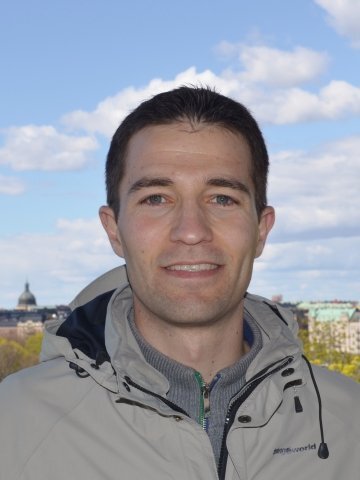4,5 MSEK to Rodrigo Fernandez Gonzalo for his research about changes in the skeletal muscle and immune system by the lack of gravity
Rodrigo Fernandez Gonzalo at the Division of Clinical Physiology has received an exciting funding of 4,5 MSEK from the Swedish National Space Agency for his project investigating the mechanisms behind the changes in the skeletal muscle and the immune system induced by the lack of gravity.

Congratulations Rodrigo! When looking at the web page for the Swedish National Space Agency's it says: “We support research projects using equipment in space, on sounding rockets and under high-altitude balloons.”
Tell us more, where do your project fit in that description? Why have you been funded by the Space agency?
Historically, the Swedish National Space Agency (SNSA) has had a firm commitment with human space exploration, supporting projects related to human health during spaceflight. My project is focused on revealing some of the mechanisms behind the changes that are caused by the lack of gravity, focusing on the skeletal muscles. We also evaluate different countermeasures to reduce the negative consequences of long-duration spaceflight. This is a key mission for all space agencies preparing for trips to Mars and the Moon.
What is the research in the project about?
The project will investigate how our genes are involved in regulating the changes seen with reduced gravity in humans. In particular, we will focus on a part of the genetic machinery that is not yet well-characterized, the long non-coding RNA. We will collect muscle tissue samples and blood, as well as perform magnetic resonance imaging and dual-energy X-ray absorptiometry to assess bone, muscle and fat mass, and multiple performance tests of physical function. This will allow us to connect the molecular mechanisms with the changes at the whole-body level, for example the loss of muscle mass. It is almost impossible to explore these factors during actual spaceflights, but we will use the bed rest facilities provided by the European Space Agency (ESA). Bed rest is considered as a good analogue to spaceflight and offers the necessary level of environmental control. We have this opportunity because ESA selected this project some weeks ago for the upcoming 60-day bed rest campaigns to be performed in Toulouse (France) and Planica (Slovenia) during 2021 and 2022. In addition, these bed rest studies will be the first ESA full-scale bed rest studies evaluating artificial gravity (short-arm human centrifugation) as a countermeasure.
What does this money mean to the project?
Without the support from the SNSA, we would not be able to carry out the project as planned. In preparation, my team and I had to prepare two parallel applications, one to ESA and the second one to the SNSA. As I said, ESA selected the project for the bed rest campaigns a few weeks ago. While ESA does not fund individual researchers, they will cover all the costs associated with the bed rest campaigns, including testing and sample collection. Now, the funding obtained through the SNSA will serve to cover the salaries of the research team, equipment, travels, and laboratory experiments and analyses.
What is your and KI:s part in the project?
This is an international project with three teams, one from France led by Dr. Jean-Pol Frippiat, another one from Slovenia including Drs. Igor Mekjavic and Adam McDonnell, and our team at KI, which comprises myself as principal investigator, and Drs. Eric Rullman, Tommy Lundberg and Patrik Sundblad. We at KI are the leading partner responsible for the majority of the experiments and data analysis. Our collaborators from France will focus on white blood cell, while our Slovenian partners will contribute with their expertise in bed rest campaigns.
In a perfect world – what would like to achieve with your research?
I believe the information gained from this project could help when designing strategies to counteract the negative effects of spaceflight on the human body. In addition, our approach including muscle, bone and immune system outcomes could be used to identify certain biological factors that are important when selecting crew members or monitor astronauts’ health during future long-term space missions. Also, the information can be of value for other conditions that simultaneously affect the skeletal muscle and the immune system, such as aging or cancer. Thus, this project is interesting from a clinical, on-Earth perspective as well.
About Rodrigo
Employed as: Assistant professor, at Division of Clinical Physiology.
Family: Married and has two children, an 8-year-old daughter and a 4-year-old son. Another child expected in 2021!
Background: Brought up in Burgos (Spain), studied at University of León (Spain) and Ghent University (Belgium). Started at KI as a post doc in 2011.
Hobbies: Any type of exercise; outdoor activities; traveling; historical novels.
